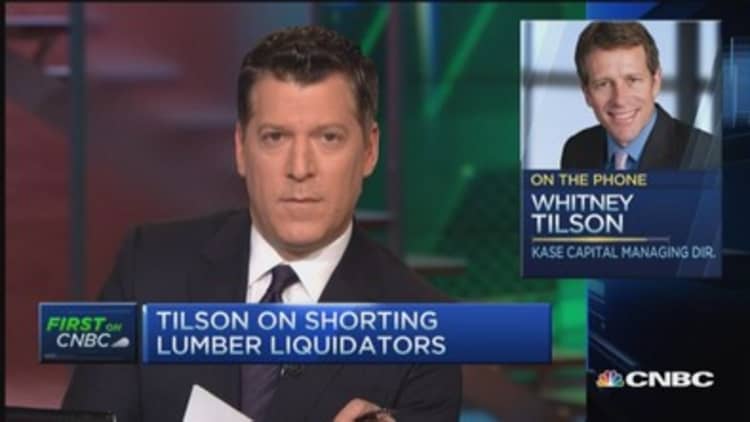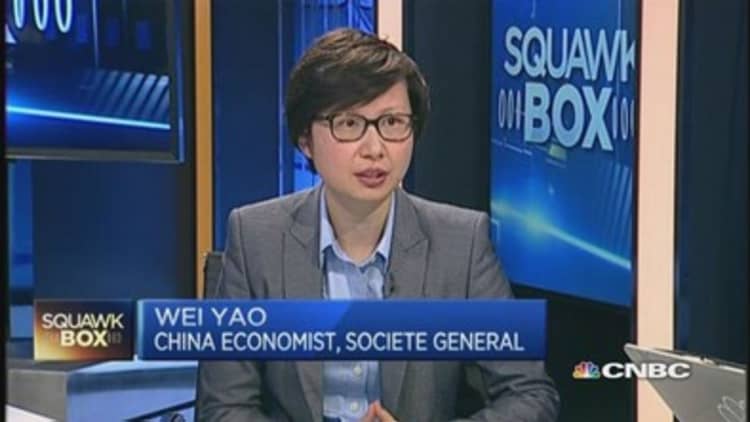Shares of Lumber Liquidators have been plummeting following "60 Minutes" allegations that some of its flooring violates health standards—the latest in a long series of American companies to get into trouble over safety problems with products made in China.
Lumber Liquidators has said that it stands by "every single plank" of its flooring and that it's the victim of reports "driven by a small group of short-selling investors who are working together for the sole purpose of making money by lowering our stock price."
Read MoreSenator urges US to probe Lumber Liquidators
Experts told CNBC that many U.S. manufacturers aren't doing what they could to ensure product quality and safety—or to protect themselves when things go wrong.
"Probably 98 percent of the time when there is a product problem in China, a lot of the blame lies with the American company," said Dan Harris an attorney who edits the China Law Blog.
Harris said he receives about five requests each week from Western companies asking for legal help on problems with Chinese suppliers. But his firm always turns down those requests because "they are usually not in a very good position to get compensated."
Read More
The only way for companies to protect themselves, he said, is to ensure that they have written the right kinds of contracts beforehand.
"If they have a really good contract with their supplier, then they should be in pretty good shape," he said. "If not, then they could have a problem."
The key to contracts, he said, is that they should "scare the heck out of a Chinese company" with very specific details about quality expectations, as well as minutia concerning subcontracts and repayment for bad products.
They start cutting corners as soon as production begins. Any company can demand a low price, and then the Chinese manufacturer kind of does what they want.Rosemary Coatesauthor, "42 Rules for Sourcing and Manufacturing in China"
Chinese manufacturers have a reputation for cutting corners.
Speaking with CNBC's "Fast Money: Halftime Report" on Monday, Kase Capital's Whitney Tilson (who brought the Lumber Liquidators story to "60 Minutes") said he did not know "whether they're just stunningly naive and incompetent, going to China and hitting the low bid. You do that on any product in China, and you will get tainted products."
Tilson's opinion is shared by others.
Read MoreMcDonald's to boost China supplier audits after scandal
"[American companies need to] understand that the contract is viewed differently in Asia than in the U.S. We sign that and think that's the end, but in China the view is completely opposite," said Rosemary Coates, a consultant about Chinese manufacturing and author of "42 Rules for Sourcing and Manufacturing in China."
"They start cutting corners as soon as production begins," she said, explaining that Chinese suppliers can often be negotiated down to their break-even price, after which they will need to find post-contract strategies to increase their margins. "Any company can demand a low price, and then the Chinese manufacturer kind of does what they want."
Because of that trend in China and some other developing countries, Coates recommends that her clients—which she said included Lumber Liquidators in 2013—adopt a "trust but verify" strategy. In other words, companies should hire local auditors, make regular site visits, and conduct independent lab testing on Chinese-made projects.

Although the number of incidents is difficult to ascertain precisely, news stories about dangerous or defective Chinese products have seemed to decrease since 2007, when Mattel recalled lead-tainted Chinese-made toys, and China's top drug regulator was executed for taking bribes that the Beijing government claimed had led to unsafe pet food, toothpaste and antibiotics.
Coates attributed the apparent decrease to international companies taking a more active role in regulating their supply chains.
In fact, she said she was surprised to learn of the "60 Minutes" allegations against Lumber Liquidators because the company had a "very good" quality assurance team that regularly conducted site visits. For its part, Lumber Liquidators said Monday that it has documentation to support each step of its production process.
Read MoreChinese milk scandal—this time with Western culprit
That assertion was backed up by Wall Street analysts researching the company.
"The 60 Minutes segment highlighted claims of unsound sourcing practices. This part was surprising to us, given the amount of investment that has taken place in LL's supply chain over the past year," Nomura retail analyst Jessica Schoen Mace wrote in a note Tuesday. She added that the company "conducts random tests and unannounced audits."

Even the right protections can still mean embarrassment if bad products make it to market, and the reputation damage can be just as problematic as the costs of a recall. When that happens, Western firms have a few options for attempting to recoup some of their losses, according to international arbitration attorney B. Ted Howes.
Generally speaking, litigation in Chinese or U.S. courts is ineffective, Howes said. Chinese firms enjoy an advantage in their home-country courts. And any judgment in the United States is "essentially a worthless piece of paper" unless the manufacturer has American assets or has holdings in a third country that shares the right treaties with the United States.
Read More The rise of 'Made by China' in America
Instead, Howes said, the most successful way for American firms to seek an award from a Chinese supplier is to enter into international arbitration—a process that requires the right provisions in a contract before any dispute arises. China has agreed to conventions that legally obligate its firms to make payments awarded by a legitimate international arbitration.
But Howes cautioned that even those awards are often only a "small percentage" of the damages suffered from importing and selling bad products.
Under the U.S. Consumer Product Safety Improvement Act and similar laws, U.S. companies stung by problems in Asian factories will usually be forced to recall dangerous products (even if only a small number of units are found to be defective), contact stores and resellers to stop sales, work to secure the products, notify the public, set up call centers and often even refund customers, Howes said.
Given the liability, some companies have explored another option: manufacturing in the United States.
Read MoreSome shrug at 'Made in USA'—but that could change
Coates, who also runs the Reshoring Institute at the University of San Diego, said that Western firms are constantly weighing the benefits of China's lower wages with product quality issues "that can devastate a company."
Lumber Liquidators was even moving away from Asia-made products before the "60 Minutes" story broke, according to Nomura's Mace, who wrote this week that the company had increased its North American sourcing in 2014, and that it would likely decrease its proportion of Asian goods this year.


